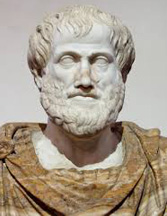Finding eternal laws in a changing world
 In Christianity the existence of one God in three forms, the Father,
the Son and the Holy Spirit, is known as the Trinity. Similarly, Western
philosophy, in its formative years, revolved around the trinity of
Socrates, Plato and Aristotle. Socrates was supposed to be the wisest
man on earth during his time. Plato relied heavily on his Theory of
Forms. According to this theory everything in the world including cats
and dogs are copies of the real ones found in the World of Forms.
Plato’s pupil Aristotle who came to Plato’s Academy at 17 did not
subscribe to his guru’s Theory of Forms. In Christianity the existence of one God in three forms, the Father,
the Son and the Holy Spirit, is known as the Trinity. Similarly, Western
philosophy, in its formative years, revolved around the trinity of
Socrates, Plato and Aristotle. Socrates was supposed to be the wisest
man on earth during his time. Plato relied heavily on his Theory of
Forms. According to this theory everything in the world including cats
and dogs are copies of the real ones found in the World of Forms.
Plato’s pupil Aristotle who came to Plato’s Academy at 17 did not
subscribe to his guru’s Theory of Forms.
Aristotle was the son of a physician to the royal family of Macedon.
He spent about 20 years at the Academy as a student and later as a
teacher. On the death of Plato, Aristotle left Athens for Ionia. He
spent several years studying the wildlife. He was later appointed as the
tutor to the young Alexander the Great.
In 335 BCE Aristotle returned to Athens and set up the Lyceum, a
rival school to Plato’s Academy. At the Lyceum Aristotle perfected his
philosophical theories and committed them to writing. On the death of
Alexander the Great, Aristotle fled to Chalcis where he died sometime
later.
Bright student
Aristotle is the shining example of a bright student who respected
his teacher while arguing with him on his theories. No doubt, Aristotle
learnt a great deal from Plato but he was not ready to accept his
theories without questioning. Aristotle particularly did not agree with
Plato’s Theory of Forms. Plato was a brilliant philosopher but Aristotle
proved himself to be a studious pupil. He was also very methodical in
his work.
|

Every action must be due to one or other of seven causes:
chance, nature, compulsion,
habit, reasoning, anger or appetite.
- Aristotle (384-322 BCE) |
Aristotle’s studies of wildlife intensified his feelings that Plato’s
Theory of Forms was flawed. Plato is reported to have admitted the flaws
in his theory when he was challenged by his own pupil. Aristotle argued
that if there was a World of Forms where everything was perfect, there
should be another higher form on which it was modelled. The argument
could go on ad finitum. Later Aristotle said that there was no need for
a hypothetical World of Forms when the reality of things can be seen on
earth itself.
The different approaches the two philosophers were due to their
background. Aristotle studied biological sciences and he used to think
scientifically. However, his guru Plato was more familiar with
mathematics and geometry. The two philosophers also shared something in
common. They were trying to find eternal laws in a changing world.
Eternal laws
Aristotle was not inclined to accept that such eternal laws were
found in a World of Forms. He found real evidence in the world itself.
He was not ready to believe that worldly things were imperfect copies of
ideal forms found elsewhere. He said that by studying natural phenomena
we can gain an insight into the immutable nature of the universe.
According to Aristotle, at birth we have blank minds. We gain
knowledge by the ideas filtered through the senses. Many centuries later
Rationalists too borrowed the idea from Aristotle. Dr Abraham T. Covoor
who spearheaded the Rationalist Association said children were born with
blank minds. They were like empty pockets.
Aristotle disagreed with Plato on this point. They did not deny the
existence of universal qualities. Now we arrive at universal truths
which gave rise to a division of philosophers into two camps. The
rationalists including Rene Descartes and Immanuel Kant believed in an
innate knowledge. The empiricists including John Locke and David Hume
claimed that knowledge came from experience.
Grand theory
Plato’s World of Forms was a grand theory which is unintelligible to
many people. However, Aristotle’s theory was down to earth. In fact,
Aristotle said that the truth of the world can be found only on
earth, not in another world.
With due respect to Aristotle, we cannot conclude that he was a
flawless thinker. According to modern philosophers, his knowledge of
geography and astronomy was flawed. Aristotle favoured the use of slaves
which went against his views of ethics. He also considered women to be
inferior humans. With all such faults, Aristotle revolutionised
philosophy and science.
|

